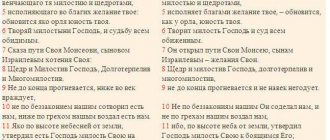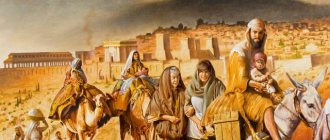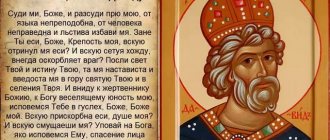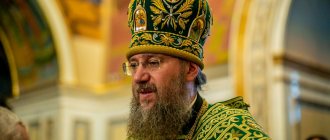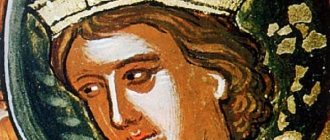Text of prayer Psalm 89
The song is sung in churches in Church Slavonic. This is an established tradition, which, according to believers, allows you to open your soul and begin communication with the Lord. But the meaning of the old language is not clear to everyone. If you experience difficulties, start with a version of the prayer adapted to the Russian language.
In Church Slavonic
In Russian
Psalm 89 Psalm
New Geneva Bible
Psalm 89 In this psalm, the only one attributed to Moses, the eternal nature of God is contrasted with the limitations of human existence. The psalm is an emotional prayer in which Moses asks God to bless the people doomed to wander in the wilderness.
89:1 Prayer. See com. to the beginning of Psalm 16.
Moses. Since the author of the psalm in question is named Moses, it can be considered the oldest of the texts of the Psalter that can be at least approximately dated.
89:3 From everlasting to everlasting You are God. In these words, the psalmist solemnly affirms the eternal existence of God. He - the Creator of the universe (Genesis, chapter 1) - has always existed. See the articles “The Self-Existence of God”; "God is the Creator."
89:4 You return man to corruption. From the biblical account of the days of creation it is known that man was created from the dust of the earth and the breath of God (Genesis 2:7). Man is mortal and, as God judged him, inevitably returns to dust.
89:5 In thy sight a thousand years are as a day. Unlike people, the Lord is not subject to time. What seems like eternity to a person is a moment to the Eternal One.
89:6 like grass. The transience of human life is contrasted with the eternal existence of God.
89:7 We are destroyed by Your wrath. The brevity of human life is God's punishment for sin.
89:8 our secret. People sin, hoping to hide sin in their hearts. However, the most hidden depths of the human heart are open to God.
89:10 seventy years. When you are young, seventy years seems like an infinitely long time. In the face of the Eternal, this time is insignificant.
89:11 Who knows the power of Your wrath...? Only Jesus Christ, who completely drank the cup of God's wrath for human sins, knows its true power.
89:12 that we may acquire a wise heart. A person who has acquired a “wise heart” knows the reason for the transience of life: his heart clings to God, the only refuge in eternity, seeking His forgiveness and blessing.
89:13 Turn, O Lord! Moses prays to God to turn to the people again, but not with judgment, but with merciful love.
How long? See com. to Ps 6:4.
89:14 by thy mercy. See com. to Ps 88:2.
89:16 Let ... Your work appear. This refers to the work of salvation and establishment of Israel.
on their sons. Moses is referring to the generation that is to settle in the promised land.
89:17 The favor of the Lord our God. Otherwise: “the grace of God.”
help us in the work of our hands. Those. Moses asks for God's blessing on all his daily activities.
Why is Psalm 89 read?
Psalm 89 is read at funerals. A person has a body that cannot live a long life, because it is fleeting and you never know what the end will be. In villages near churches, a prayer is recited when wishing for rain during the dry season.
You can read the prayer at home. The Russian version is suitable for this. Kneel in front of the icon, light the candles, clear your mind. Worldly experiences should not disturb your heart; be calm during dialogue with Him.
89:1 Prayer of Moses, the man of God.If your request is pure and your thoughts are noble, the Lord will listen to you and grant you what you want.
The prayer of Moses, most likely the same one who led the Israel of God out of Egypt. It is interesting to listen to what this man prayed to God for, so that one can recognize the aspirations of the ancients and compare them with the aspirations of modern people who pray to God.
89:2 God! You are our refuge forever and ever.
Moses describes God's meaning for mankind, beginning with the recognition of His saving power for God's people throughout eternity from generation to generation.
89:3 Before the mountains were born, You formed the earth and the universe, and from everlasting to everlasting You are God.
Further, Moses recognizes the absolute right of God to rule over humanity on the simple basis that He is the Creator of it and everything that was created to live on earth. He recognizes in God the Ruler of eternity, from century to century, that is, he understands that there is no other Ruler Almighty over the universe.
89:4 You return man to corruption and say: “Return, sons of men!”
By God's judgment, all the descendants of Adam return to corruption, to the dust of the earth, from which their ancestor was originally made. Their departure into non-existence completes the circle of existence with the same beginning and end: the start and finish are closed for every person living in this century - in a state of non-existence.
89:5 For in Your sight a thousand years are like yesterday when it is past, and [like] a watch in the night.
And in this vanity of human existence, millennia pass for God, like one passing day for man; They are as insignificant in time for the eternal God as one day is for the perspective of human life. (this text should not be used as a Biblical basis for trying to calculate the chronology of prophetic dates; it simply compares the incommensurability of time from the point of view of God and man).
89:6 You [like] a flood carry them away; they are [like] a dream, like grass that grows in the morning, blooms and turns green in the morning, is cut down in the evening and dries up;
A person is “blown away” from life as easily as if washed off the deck by a wave. And a human century weighs nothing: it is like the century of one-day-old grass. In the morning it manages to grow, turn green and even break dawn. But the time of her joy on earth is short: by evening the grass dries up and her life is cut off.
89:7 for we are consumed by Thy wrath, and by Thy wrath we are dismayed.
Why such a sad picture? Because human iniquities hinder the ability to live forever. God cannot allow a person who sins to live in His universe forever. Moses understands that it is not God who is to blame for the shortness of man’s days, but the living man himself. The wrath of God and His desire to “wash away” man from the earth’s deck is a natural reaction to the behavior of man, who strives to destroy what God is creating.
89:8 You have placed our iniquities before You and our secrets before the light of Your face.
God has the ability to lay out human iniquities before Him, obvious and secret, and on the basis of them come to the conclusion that it is impossible to allow people to live forever as long as He has something to lay out before His face.
89:9 All our days have passed in Thy wrath; we are losing our summers like a sound.
Moses understands that God has something to be angry with man for, and therefore a short human age passes without benefit, God even has nothing to rejoice at, only He is saddened by the picture of the existence of sinful man on earth. That is why a person loses his years rapidly, and they pass before his eyes like a sound: almost instantly, even if you look with human eyes, not like heavenly time calculation.
89:10 The days of our years are seventy years, and with greater strength - eighty years; and their best time is labor and illness, for they pass quickly, and we fly.
Moses knows what he’s talking about: the maximum that can be “squeezed” out of a person’s life is on average 80 years, but during these 80 years a person often has nothing to remember: life flies by so quickly that there is nothing except illness and labor manages to be deposited in human memory, his impressions of illness and the need to work all his life are so vivid that everything else, even if it happens to be moments of joy, then against the background of lifelong exhaustion fades and is forgotten. Such is the prose of this happy life.
We are flying
- this is a metaphor for understanding the transience of life: we don’t walk along it, but fly so fast that we don’t have time to notice anything when old age sets in
89:11 Who knows the power of Your anger, and Your wrath according to the measure of Your fear?
No one can know the power of God's wrath, where it stops or whether it stops at all; no one knows exactly when our lives will end, giving way to God’s wrath against us. (this is how Moses figuratively describes the essence of man’s departure from this world, for if God had not been angry with man for his iniquities, then there would have been no departure for him forever).
89:12 Teach us to number our days in such a way that we may acquire a wise heart.
Therefore, Moses asks God to teach man to use this little time for life so as not to squander it uselessly, but to devote it to acquiring a wise heart, obedient to God. For God will not be angry with the wise in heart, and therefore the years of life of the wise will be increased. And Moses knows this.
89:13,14 Turn, Lord! How long? Have mercy on Your servants. 14 Satiate us early with Your mercy, and we will rejoice and be glad all our days.
Moses asks God to satisfy Him early with His mercy - not to wait for the time when man absolutely stops sinning, but, as if in advance, asks for pity, to have mercy on human weakness, out of pity, and not according to merit. For if human affairs are decided with justice and according to merit, and not out of mercy and not out of pity, then there is no point in living at all, such a person does not deserve the favor of God. But if God takes pity on the weakness of mortals and weakens His anger, then a person still has a chance to live and have time to rejoice at least a little in the few days of his life before God.
89:15 Make us glad for the days [in which] You struck us, for the years [in which] we saw disaster.
Moses asks for at least some relief in life, so that he will not spend all 80 years in a state of bending over the hardships of life, but will also have time to feel the joy of his heart from the fact that God favors His people.
89:16,17 May Your work appear on Your servants and Your glory on their sons; 17 And may the favor of the Lord our God be upon us, and prosper us in the work of our hands, prosper us in the work of our hands.
Moses asks to manifest His work on His sons and His servants, so that at least they themselves can understand that they are His servants and His sons. In what ways can the work of God be manifested on the sons and servants of God? The fact is that their sorrows will be replaced by success in all human affairs that glorify God.
As we see, Moses’ prayer to God was not a request for a solution to personal problems, but was a reflection on the great deeds of God, a search for the causes of the plight of man on earth, a search for possible solutions, at least in easing the strong pressure of circumstances to a more or less tolerable state (he did not was talking about getting rid of problems, because he understood that they were all deserved), he asked for help for all of God’s people, but not a word about himself personally in this prayer of Moses.
Moses did not turn this conversation with God into a consumer-economic monologue about personal needs. But I thought about what could be done in this life to glorify God, in order to meet the 80 years allotted by God for those living on earth in this wicked age.
It is no coincidence that Moses was called the meekest man on earth, obedient to God in everything and caring not about his own spiritual problems, but about the glorification of the Creator.
Interpretation
To understand the meaning of the entire work, you should pay attention to each verse in the song.
- Verse 1-3. God is omnipotent, he influences the world, man cannot live without his influence. Only he is able to protect a person from adversity and shelter him from troubles.
- Verse 4. Life is fleeting, everyone has their own time. Verse 4 tells us this.
- Verse 5-6. People and the Lord are compared. There is no such person who could outlive the Lord, for whom even a thousand years passes as one day. Man has limited time. He can die at any moment, he is short-lived.
- Verse 7-12. Man is born in sin and is subject to sin every day. God is pure and sin does not attack him. But the Lord’s anger at people who realize the harmfulness of sin, but still succumb to it, is inexpressible.
- Verse 13-17. Moses wants the Lord to love his people again. The time of testing dragged on, the Israelis realized their sins. What is important to Moses in these verses is that the Lord still forgives the Jews and grants them peace and prosperity.
Interpretation of the Psalm of Moses
At the very beginning of Moses’ prayer, we read about the exaltation of God, the establishment of His protection and help in all our days, when the Creator is the only refuge in the days of everyday storms.
1 Prayer of Moses, the Man of God
2 Lord, You are our refuge from generation to generation!
3 Before the mountains arose and the earth and the universe were created, from everlasting to everlasting you are!
4 Do not subject man to humiliation, for You said: “Return to the earth, sons of men!”
5 For a thousand years are in your sight, O Lord, like yesterday, which is already past, and like the time of the watch of the night.
6 The years of men are insignificant; Life will quickly fade, like grass: in the morning it will bloom and soon wilt; by evening its color will fade, it will turn yellow and wither.
7 For we have fainted from Your wrath, and from Your wrath we have become dismayed.
8 You look at our iniquities, you illuminate our lives with the radiance of Your face.
9 For our days are shortening, and we are faint from Your wrath.
10 The years of our life are scattered like cobwebs; the measure of our years is seventy years, but if we are able, it is eighty years, plus sorrow and illness; by this we gain humility and are edified.
11 Who will know the power of Your anger, and in the fear of You who will comprehend Your wrath?
12 Therefore show me Your saving right hand and people who have strengthened the heart with wisdom!
13 Turn your gaze to us, O Lord! How long will you be angry? Have mercy on Your servants!
14 Let us be filled with Thy mercy in the morning, O Lord, and rejoice and be glad;
15 We will rejoice all our days, for the days when You humbled us, for the years when we experienced evil.
16 Look on Your servants, on Your creations, and instruct their sons!
17 And may the light of the Lord our God shine upon us. Correct the works of our hands, correct the works of our hands!
Moses emphasizes that everything, heaven and earth, was created by God, who is Alpha and Omega, the Beginning and the End.
- Human life is fleeting, the prophet in verse 4 begs the Creator to guide the human soul through life so that at the end of life a person is not humiliated, rejected, given over to the power of Satan. Only the body of Christians returns to dust, and the soul of the righteous goes to the Creator, to Heaven, from where it came by the will of the Almighty.
- Verses 5-6 describe how short life on earth is, for the Lord a thousand years are like one day, and the life of people is like a flower that blooms in the morning and withers by night. A person who cares more about earthly goods should think about these words.
All is vanity of vanities, wrote King Solomon, if there is no God in it.
Earthly life flies by instantly, people fuss around material wealth, forgetting about love for the Creator and neighbor, for this is the only road leading to eternity. Earthly life and stay in eternity are synonyms, one is a continuation of the other .
There is no righteous person without sin on earth, the Lord is a strict Judge, He punishes us in anger, sometimes He becomes furious at human iniquities, but all this is for the good of people. Being in the wrath of the Lord, a person begins to repent, confess, renouncing a sinful life. The face of the Creator is revealed to the sinner in all its grandeur and light when purity of soul and heart comes.
- Verses 9-11 again emphasize the shortness of life. What are 70 - 80 years compared to eternity, if the main part of them consists of sorrows, illnesses, vanity and futile suffering.
Good is the man who, in the power of the wrath of the Lord, discerns the hand of salvation. The Creator led the Jewish people through the desert for 40 years, punishing them for grumbling and sins, although this road can be covered in 2 weeks.
So in the life of Christians, some quickly come to the grace of the Creator, living according to His Laws, while others walk around it for years, remaining in sin.
Psalm 89 in Orthodoxy is usually read during funerals
- In the second part of Psalm 89, Moses turns to God in a prayer to return His mercy, to return joy, to give joy to the people after a difficult journey through the desert.
The Prophet Moses does not ask the Lord to no longer punish the Jews; on the contrary, he begs to continue to instruct his sons, to correct the works of human hands, so that the glory of the Lord will shine over the whole world.
